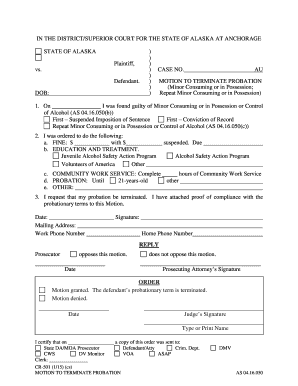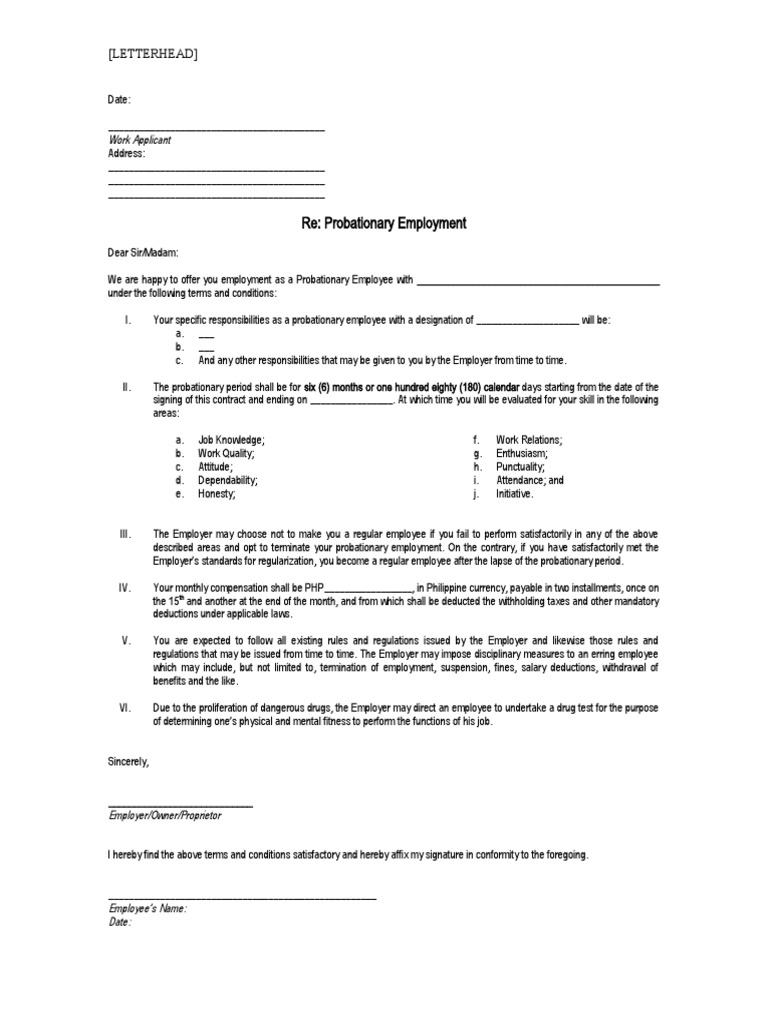5 Terms for Probation Employers on Paperwork

Probation periods often come with a set of paperwork that outlines expectations, responsibilities, and terms for both the employer and the employee. Understanding these terms is crucial for a smooth onboarding process and to ensure that all parties are on the same page. Here are five essential terms that employers should focus on when dealing with probation paperwork:
1. Probation Period Duration


The length of the probation period is a critical piece of information. This term defines how long an employee will be under probationary status before transitioning to a permanent role or having their employment terminated. Typically, probation periods last anywhere from 30 to 90 days, but some industries might extend this up to six months or even a year.
- Why it matters: The duration sets the timeline for performance evaluations and allows the employer to assess the new hire’s fit for the company culture and job requirements.
- Legal considerations: Depending on local labor laws, there might be restrictions on how long a probation period can last, ensuring employees aren’t left in limbo indefinitely.
2. Performance Expectations

Setting clear performance expectations during probation is vital. This involves outlining the specific goals, tasks, and KPIs that the employee should meet.
- Specifics: Include job duties, objectives to be achieved, and any required certifications or training.
- Feedback loops: Regular check-ins or formal reviews to provide constructive feedback on performance, helping the employee understand their strengths and areas for improvement.
3. Termination or Extension of Probation

This term outlines the conditions under which an employee’s probation might be extended, terminated, or confirmed into permanent employment.
- Termination: The criteria or reasons for ending employment during probation, which might include failure to meet performance standards, disciplinary issues, or attendance.
- Extension: Sometimes, an employer might decide to extend the probation period if they see potential but feel additional time is needed to evaluate the employee’s suitability fully.
🔔 Note: Extending probation requires clear justification and should align with company policy and local labor laws to avoid legal complications.
4. Salary and Benefits During Probation

Details on compensation and benefits during the probationary period can vary significantly from company to company.
- Probation pay: Often, there’s a difference in pay or an expectation of lesser benefits during probation, but this must be communicated explicitly.
- Benefits: Employees on probation might not be eligible for certain benefits like health insurance or vacation time until they become permanent employees.
5. Confidentiality and Non-Compete Clauses

These clauses are legally binding terms that protect the company’s interests.
- Confidentiality: Protects company information and trade secrets from being disclosed or used improperly by the employee.
- Non-compete: Prevents the employee from working for competitors or starting a competing business within a specified period after leaving the company.
Wrapping Up

Understanding and implementing these terms in probation paperwork can lead to a more structured and fair probation process for both the employer and the new employee. It ensures that expectations are set, legal requirements are met, and the employee has a clear path to becoming a valued member of the organization.
Employers need to review these documents carefully, ensuring they align with company policies and local employment laws. Clear, concise, and transparent communication during the onboarding process, especially regarding probationary terms, can set the tone for a successful employee-employer relationship.
What happens if an employee does not meet the performance expectations during probation?

+
If an employee fails to meet the performance expectations set out in their probationary terms, several options are available:
- Termination of employment, provided there’s a fair process in place.
- Extension of the probation period with a performance improvement plan (PIP).
- Additional training or coaching to address specific shortcomings.
The employer must handle the situation with transparency and fairness, ensuring the employee understands the areas of concern and has an opportunity to improve.
Can the probation period be extended?

+
Yes, an employer can extend the probation period if:
- The employee has shown potential but needs more time to meet expectations.
- There have been circumstances that impacted their ability to perform, like illness or personal issues.
However, the extension must be clearly justified, documented, and in line with employment laws and company policy.
What are the key considerations for implementing a non-compete clause during probation?

+
Key considerations include:
- Ensuring the clause is reasonable in scope, duration, and geography.
- Having a clear business interest to protect.
- Providing something of value to the employee in exchange for their agreement to the clause (like specialized training).
- Adhering to local laws, as some jurisdictions have restrictions or outright bans on non-compete clauses.
How should an employer handle an employee who fails to maintain confidentiality during probation?

+
Handling a breach of confidentiality involves:
- Documenting the breach thoroughly.
- Conducting an internal investigation, possibly with HR involvement.
- If proven, the employer might:
- Issue a formal warning.
- Implement disciplinary action.
- Consider legal action if the breach is severe.
- Terminate employment for violation of contract terms.
The action taken should reflect the severity of the breach and be in line with company policies.